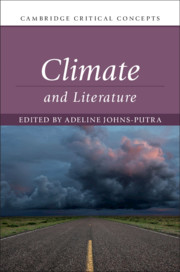Book contents
- Climate and Literature
- Cambridge Critical Concepts
- Climate and Literature
- Copyright page
- Contents
- Illustrations
- Contributors
- Acknowledgements
- Introduction
- Part I Origins
- Chapter 1 Literature, Climate, and Time: Between History and Story
- Chapter 2 Atmosphere as Setting, or, ‘Wuthering’ the Anthropocene
- Chapter 3 The Seasons
- Chapter 4 Climatic Agency in the Classical Age
- Chapter 5 Weathering the Storm: Adverse Climates in Medieval Literature
- Chapter 6 The Climate of Shakespeare: Four (or More) Forecasts
- Part II Evolution
- Part III Application
- Bibliography
- Index
Chapter 3 - The Seasons
from Part I - Origins
Published online by Cambridge University Press: 31 July 2019
- Climate and Literature
- Cambridge Critical Concepts
- Climate and Literature
- Copyright page
- Contents
- Illustrations
- Contributors
- Acknowledgements
- Introduction
- Part I Origins
- Chapter 1 Literature, Climate, and Time: Between History and Story
- Chapter 2 Atmosphere as Setting, or, ‘Wuthering’ the Anthropocene
- Chapter 3 The Seasons
- Chapter 4 Climatic Agency in the Classical Age
- Chapter 5 Weathering the Storm: Adverse Climates in Medieval Literature
- Chapter 6 The Climate of Shakespeare: Four (or More) Forecasts
- Part II Evolution
- Part III Application
- Bibliography
- Index
Summary
The seasons are one of the most prevalent means by which literary texts engage with and represent climate. This chapter explores the implications of the seasonal perspective of climate, and argues that literary texts have used the seasons as a domain for interrogating the interface between nature and culture. The first half of the chapter traces a history of literary representations of the seasonal cycle. This climate model of change-within-constancy has been interpreted variously as a source of reassuring stability or as evidence for nature’s hostility. The second half of the chapter focuses on individual seasons and the cultural associations that have accumulated around them. Particular seasons are associated with particular human activities, emotions, psychological states, and literary genres. Often the most interesting examples of seasons literature are those texts that interrogate these associations and ask whether nature or culture has shaped our responses to and expectations for each season.
- Type
- Chapter
- Information
- Climate and Literature , pp. 45 - 59Publisher: Cambridge University PressPrint publication year: 2019
- 2
- Cited by

